MEI instead of DEI
Hire for Merit using MEI assessments
Select candidates by assessing work style, culture fit, personality and cognitive ability.
Discover character, ability and mission alignment using assessments and AI that matches for merit first.
Discover character, ability and mission alignment using assessments and AI that matches for merit first.
Startup? Apply for -90% discounts
MEI recruiting tools for startups
Pursue a merit-based hiring process based on technology and smart design. Evaluate candidates based on their competencies, culture fit/add, values and cognitive ability.
Align Culture fit & Values
Measure cultural interests and rank values to compare candidates & teams.
Hire for cognitive ability
Increase performance in the workplace by hiring for merit and competencies.
Objective candidate ranking
Evaluate based on qualifications, skills and fit rather than demographics.
Hire using behavioral, psychometric and cognitive assessments
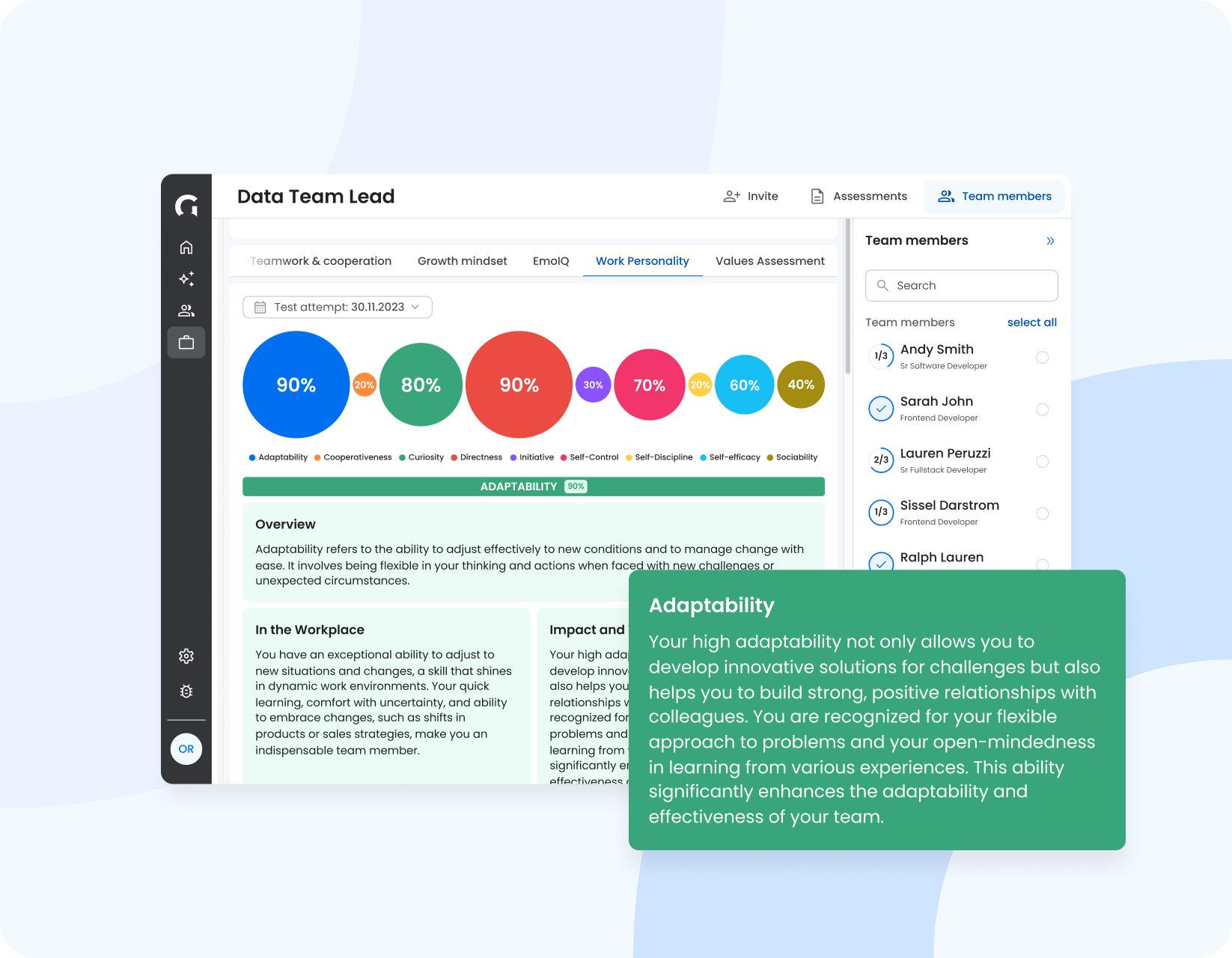
Rank of Values
Rank the most empirically validated universal values that your team and individuals believe in. Discover who wants what and align your team for cultural fit.
Learning Agility
Test anyone’s adaptability and learning inclination to get a sense of their growth mindset.
Work Strengths
Discover and measure character and personality strengths to figure out role fit, promotion plans and improve internal talent mobility.
Bet on meritocracy to improve performance and team diversity
Stack rank candidates based on objective criteria for each role, candidates preferences and your preferences, for each recruiting project. Use the best preference and personality tests for the workplace that bring forth candidates who ‘fit’ both your culture and role, and can be culture additive to your organization.
MEI instead of DEI
Remove hiring bias
Eliminate signals that lead you to make biased decisions.
Hiring based on merit
Look for merit, quality and “fit”. Run recruiting the right way.
Quality methods & tools
Hire pre-vetted applicants using proprietary assessments.
For Founders and People leaders focused on culture and merit
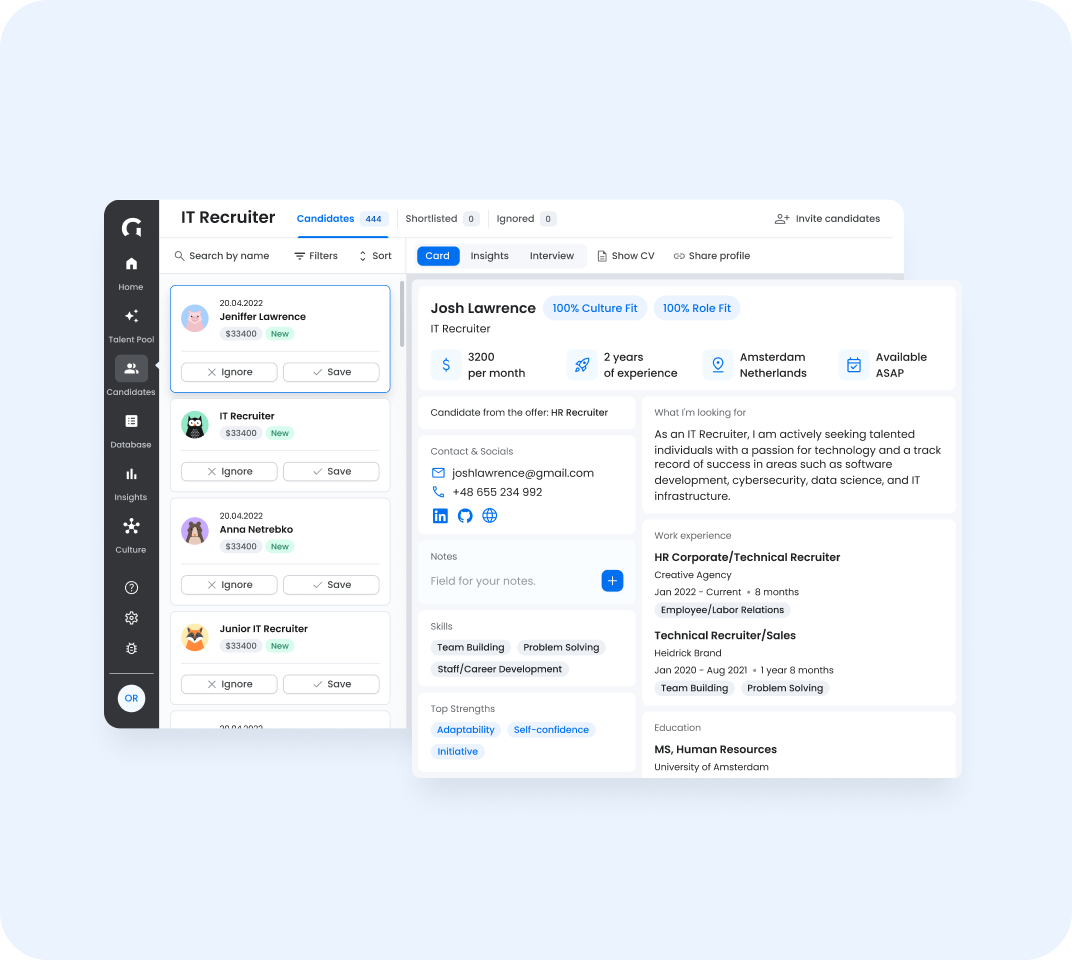
Screen applicants holistically
Screen for team culture preferences, personality traits, and ability - in line with MEI principles. Easily evaluate applicants to save time on CVs and interviews, identify who to interview first, who could be a great fit for your remote work setup based on shared values and cultural preference
Research shows that people self-select into occupations depending on their preferences, that certain personalities “fit” certain types of work better, and that cognitive ability is extremely important in complex work (such as in tech).
Research shows that people self-select into occupations depending on their preferences, that certain personalities “fit” certain types of work better, and that cognitive ability is extremely important in complex work (such as in tech).
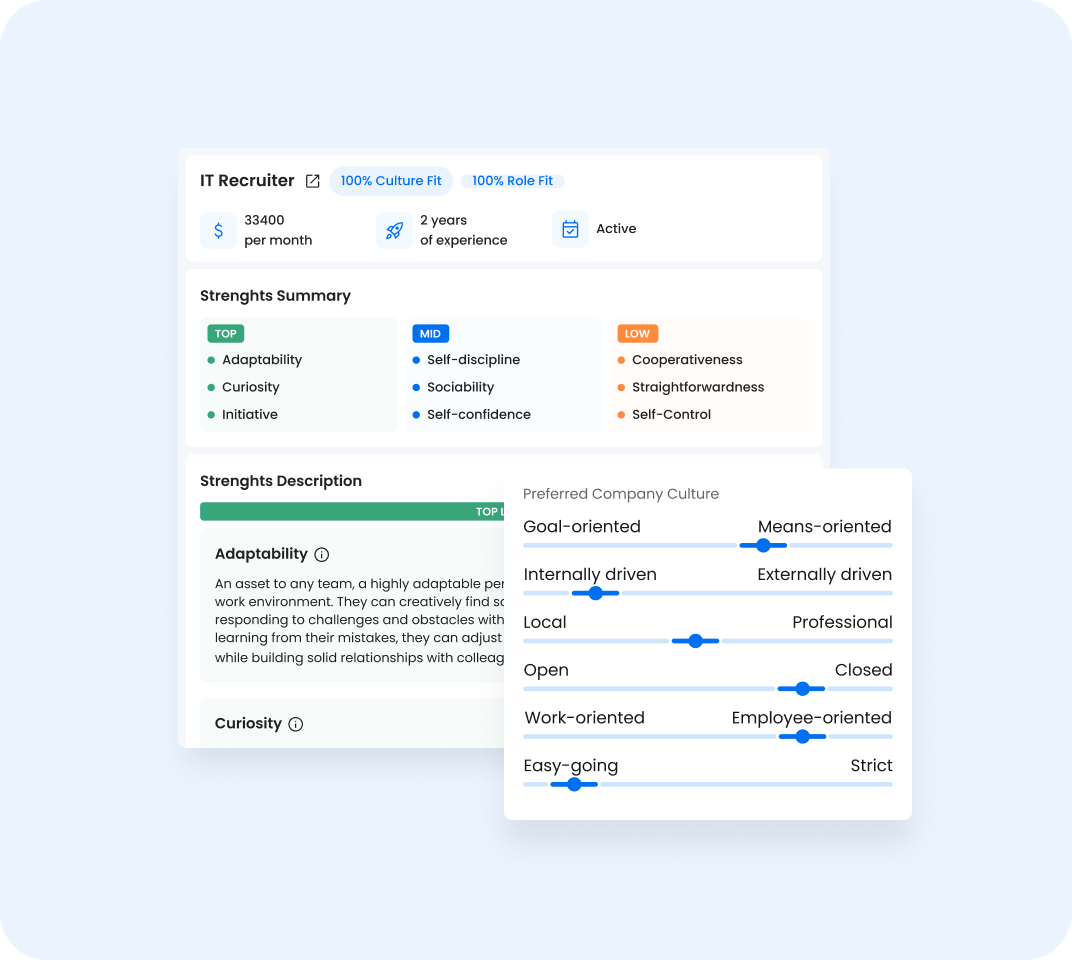
Measure cognitive ability
We test for abstract reasoning ability (a key factor in hiring for any roles with tech companies) in order to help you discover high potential, motivated candidates capable of performing at the highest level. Ideal for MEI-first companies.
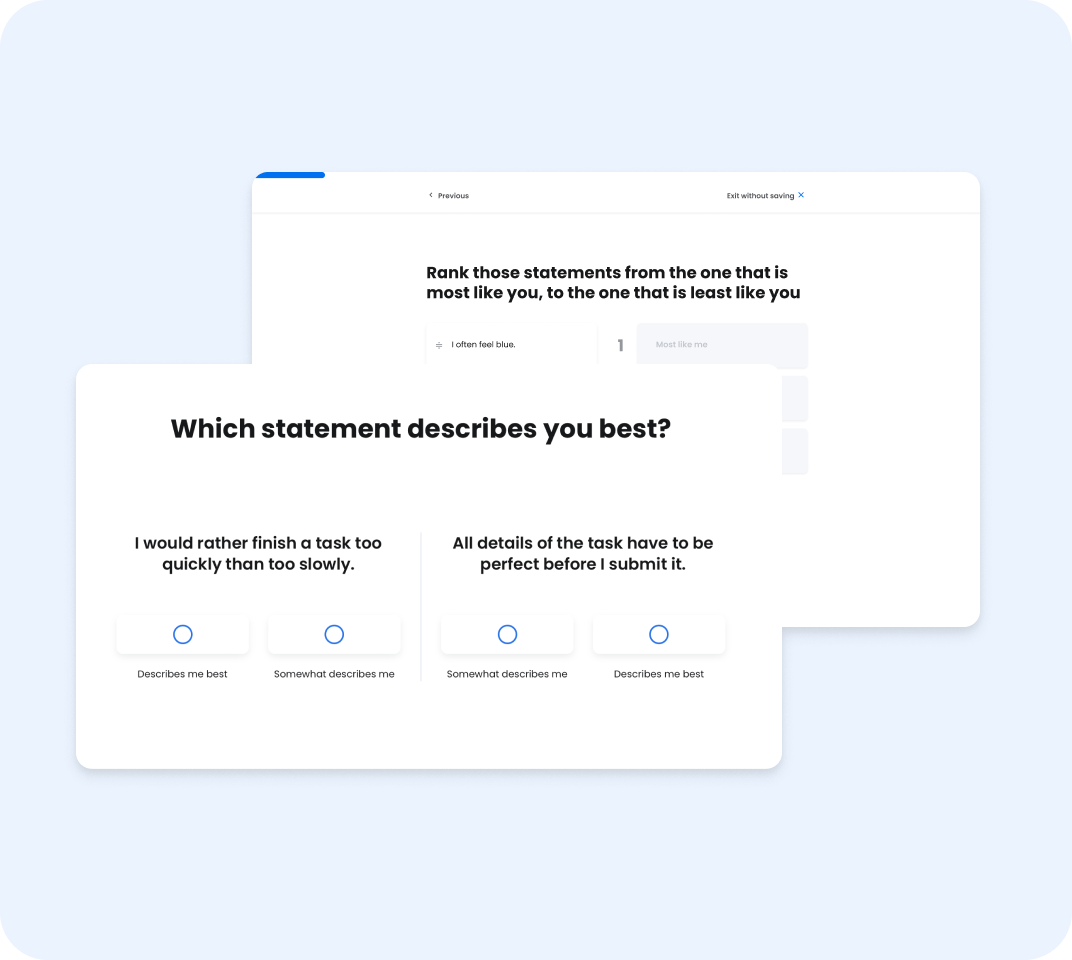
Candidate-first assessments
We design candidate-oriented assessments (that’s how we built our product from day 1), not ‘big brother’ tools, in order to give people a smooth experience where Gyfted provides them with feedback and personal development accounts on our platform.
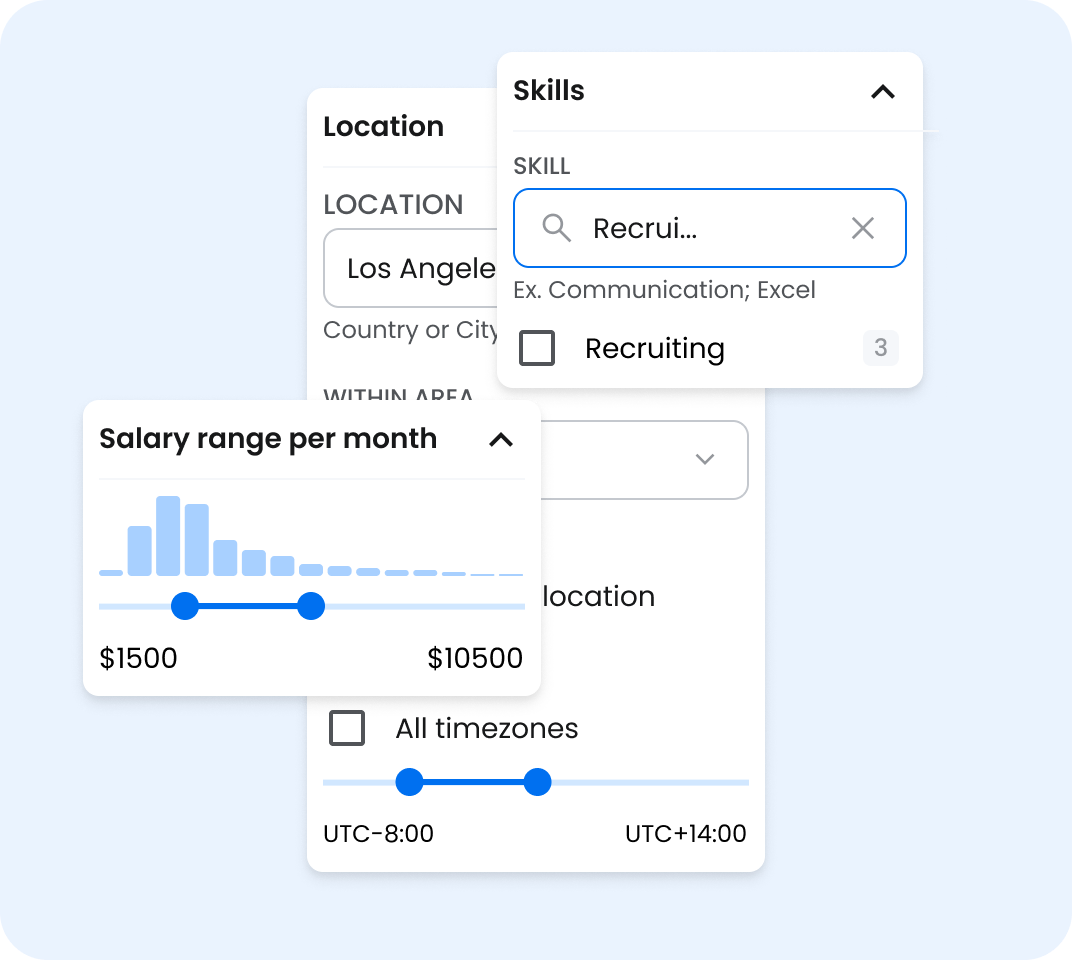
Remote mode filters
Filter your applicants for skills, time-zone, geography, region, salary and work eligibility. Sort applicants by role fit and overall fit relevant to the role, your needs and distributed team setup. Avoid wasting time on candidates that clearly don’t line up with your remote setup.
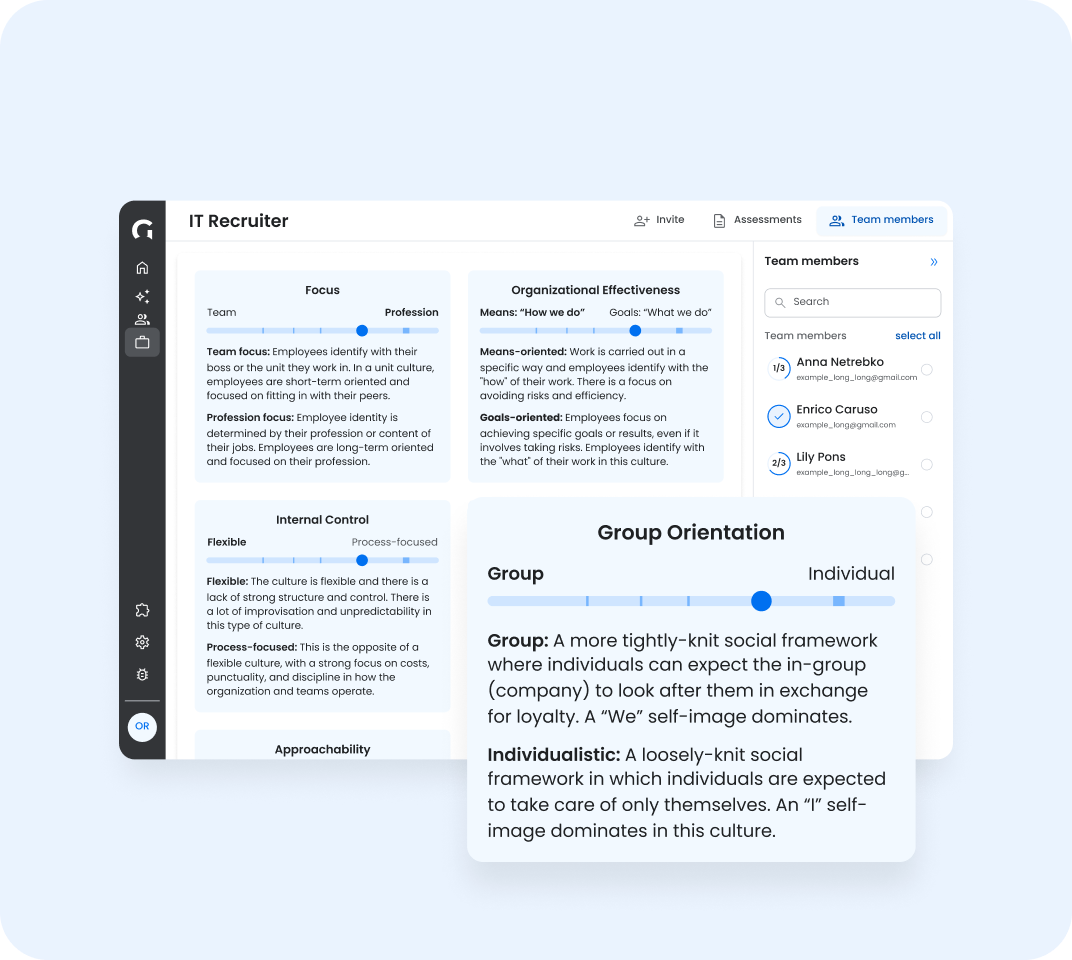
Robust culture measures
Discover your remote team culture in terms of the leading methodology for uncovering organizational culture - Hofstede’s cultural dimensions. Get insights into who to hire from a culture add point of view. Because we all perform differently in various distributed work environments, hiring skills first only doesn’t work. The remote culture you’re hiring for will impact your performance and team dynamics.
Remove biases and improve retention
Similarity bias
We tend to search for people similar to us to avoid conflict. It easily leads to the forming of “yes-men” teams which are not the most creative or high performing this way
Gender bias
Stereotyping based on gender is very pervasive among humans and this is a major bias that influences suboptimal decision-making in recruitment.
Halo effect
Involves making snap judgments someone on the basis of a trait, for example someone worked at Instagram = “must be great”
Horn effects
Making a snap judgment based on a single negative trait, for instance when a candidate mentions one wrong thing and can be boxed out by seen as a villain
Quality data and UX to improve your hiring
Measure and match candidates to fit you and your team. Select based on skills, experience, personality and culture fit. Make faster hiring decisions with better results.
Quality UX & quality tools
Discover culture fit/add, role fit, soft competencies and cognitive ability in your candidates using quality assessments in a vectorized database. We do not parse CVs for keyword matching and we quantify data into indexes to eliminate structural bias.
Avoid information bias
We do not present or collect data on age, gender, race, minority status, or photos that impact all people’s decision-making through first impression bias. We focus on candidates, quality data, design to improve your outcomes and save you time.
Our assessments are designed by top scientists
Our tools are developed by psychologists, psychometricians and cognitive scientists
with research experience from institutions like these:
with research experience from institutions like these:
Hire for Merit, Excellence and Intelligence
Frequently asked questions
What is MEI?
MEI stands for Merit, Excellence and Intelligence. Alex Wang, the founder of Scale.ai, introduced the concept of MEI as a hiring strategy at his company. This approach prioritizes merit-based recruitment, which Wang credits for Scale AI's success. He contends that this method attracts and retains top talent while fostering a culture of excellence. MEI is described as an objective hiring practice that avoids biases associated with demographic factors. Wang advocates for evaluating individuals based on their personal qualities, abilities, expertise, and work ethic. Proponents argue that this merit-focused approach naturally results in a diverse workforce without sacrificing performance standards.
How can unconscious bias affect interviewing candidates?
Biases can lead to unfair evaluations and missed opportunities to hire qualified candidates. Awareness, structured interview processes, as well as the use of standardized testing/assessments can help mitigate these effects. Unconscious bias can affect interviewing candidates this way:
1. First impressions: snap judgments based on appearance or mannerisms.
2. Similarity bias: favoring candidates similar to the interviewer.
3. Stereotyping: making assumptions based on gender, race, age, or background.
4. Halo/horn effect: letting one positive or negative trait influence overall perception.
5. Confirmation bias: seeking information that confirms preexisting beliefs about a candidate.
6. Name bias: judging candidates based on their names.
7. Affinity bias: connecting more with candidates who share similar interests or experiences.
How to limit unconscious bias?
Companies are increasingly implementing strategies to combat unconscious bias in their hiring processes. Many organizations now use standardized assessments that focus on job-relevant skills and abilities, reducing the impact of subjective judgments. These assessments are often designed and validated to ensure fairness across different demographic groups. Additionally, companies are leveraging data analytics to monitor and address potential biases in their hiring outcomes, regularly reviewing metrics to identify any disparities. Structured interview processes have also become more common, where all candidates are asked the same set of predetermined questions in the same order, and responses are evaluated against consistent criteria. This approach helps to ensure that each candidate is assessed on the same factors, minimizing the influence of personal biases. Some companies also implement blind resume reviews, removing identifying information that could trigger unconscious biases. By combining these methods, organizations aim to create a more equitable and merit-based hiring process that identifies the best candidates regardless of background.